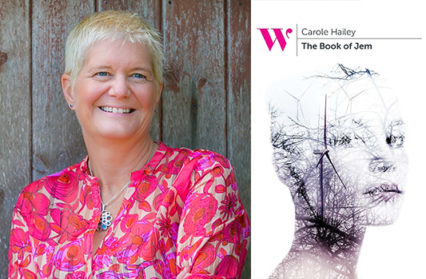Gareth Smith reviews Carole Hailey’s debut novel, The Book of Jem, a story constructed around a struggling atheist society divided into cynics and believers.
Carole Hailey’s debut novel is not one to read for escapism from the bleak confines of 2020, unless to consider how things might be worse. Set in a post-religious dystopia, The Book of Jem depicts the grim and joyless existence of a rural village in the aftermath of cataclysmic world wars. With swathes of the population exterminated, the natural world ravaged and fertility rates plummeting, life seems uniformly awful until the arrival of a mysterious stranger. Emerging from the winter snowstorms, Jem’s claim to be hearing God’s voice is the ultimate taboo in a society that has re-built itself by fundamentally rejecting all religious belief.
Hailey constructs a detailed and intricate society for her characters to occupy, painting her Godless world with some interesting and macabre touches. The village of Underhill relies on failing wind turbines to keep the lights on, collects food from drone deliveries and is monitored by a distant, but threatening, political authority. The exposition required to convey this information can sometimes feel a little clunky, but once the contours of Hailey’s world are established it becomes a captivating setting. Many of the elements, such as the reliance on remote technology, are plausible extensions of the present while others are fascinating for their inventive morbidity. The Files, a collection of post-mortem images that residents are paid to sift through and identity, add a particularly gruesome flavour to the novel.
Jem’s arrival at Underhill, and her subsequent revelation that she is receiving instructions from God, causes predicable shockwaves to ripple through the community and becomes a rift that divides the believers from the cynics. Hailey explores this divide by alternating between two narrators – Eileen and Kat. This is particularly useful for highlighting the subjectivity of individual perspectives; the same event becomes two different stories when told from the unique viewpoint of each narrator. Kat is a staunch skeptic of Jem and the obvious ‘voice of reason’ within the community, but she is also a less interesting character as a result. As she loses family members to the cult growing around Jem, it is often difficult to sympathise with her repetitive rants.
Eileen, on the other hand, is far more engaging. A social outcast for most of her life, she seizes the opportunity for status by becoming Jem’s first and most ardent disciple. Equal parts grotesque, pathetic and ruthless, her lack of awareness provides frequent moments of comedy and, occasionally, pathos. While Kat’s relationship to Jem is one of loss, Eileen only gains by her devotion to the new prophet and the novel skillfully examines how religion can offer both a comfort, and a dangerous dependency, to the vulnerable. It is fitting that Eileen, the fanciful but engaging storyteller, ultimately proves far more compelling than Kat, the dependable but dull chronicler. Much like explanations for the meaning of life, an ostentatious narrative is often more attractive than the mundane truth.
While there is nothing particularly new in examining the drawbacks of religion and its tendency towards fanaticism and violence, The Book of Jem offers a slightly different take on the matter by suggesting our desire for intelligent design is more of a compulsion than a choice. Even under the complete banning of God, many residents of Underhill (including committed atheist Kat) have adopted superstitious beliefs that come perilously close to it, while the fervent commitment to atheism required by the authorities is a religion in all but name. There is a chilling speed to which Jem’s followers adopt the symbols, rituals and ceremonies of worship, which suggests that they are following an intrinsic pattern of behaviour.
While neither the most timely nor the most complex exploration of these issues, The Book of Jem nonetheless crafts some engaging characters and raises a few interesting questions as it explores the seemingly unbreakable threads between human beings and higher powers.
The Book of Jem by Carole Hailey is available now from Watermark Press.












